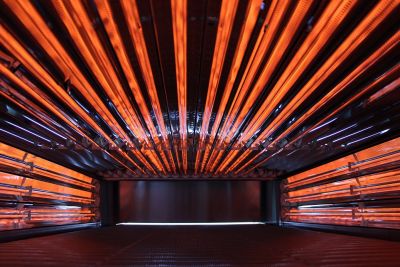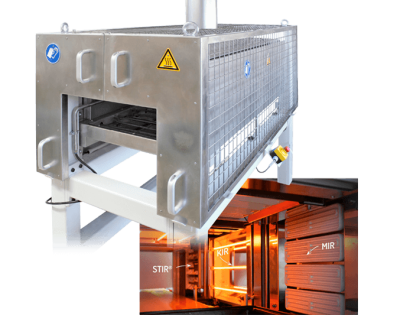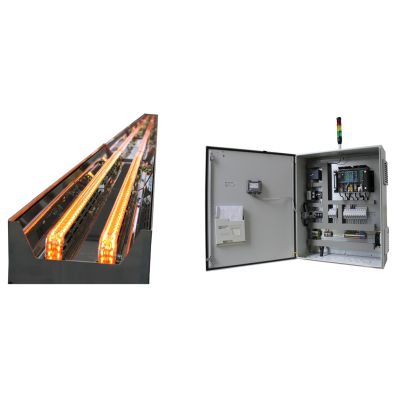Heating organic sheets: Heating to forming temperature is necessary before forming fibre-reinforced thermoplastics
In the vehicle industry, hybrid lightweight construction describes the forward-looking way to reduce vehicle weight and increase resource efficiency. In addition to aluminium, thermoset and thermoplastic fibre composites known as organic sheets are used here. The key to large-scale production of components made of fibre-reinforced plastics lies in the use of established manufacturing processes, such as sheet metal forming. Before thermoforming organic sheet, it must first be heated to forming temperature. In this process, the thermoplastic matrix reaches the glass transition temperature and is then formed in a forming press and, if necessary, additionally back-injected. Due to cost pressure and the availability on the world market, carbon fibre reinforced plastic (CFRP) is also used in highly stressed areas in addition to glass fibre reinforced plastic.
Infrared radiation as an optimal heat source for heating organo sheets
In industrial series production, high throughput plays a decisive role. Therefore, fast and reliable heating of the plastic matrix is essential. Otherwise, the required quantities would not be achieved and other materials would be used. Infrared emitters represent a powerful and at the same time efficient heat source, with the help of which it is possible to heat the organic sheets to forming temperature in less than 60 seconds. In addition to fast heating and reaction times, infrared emitters offer direct, precise and process-safe controllability depending on the product temperature.
What has to be considered in the production of organic sheet?
In order to be able to form thermoplastics, it is necessary to reach the respective glass transition temperature. Overheating of the semi-finished products must be prevented. Equally decisive criteria are temperature homogeneity and sufficient heat penetration. Controlling the heating power according to the product temperature ensures an automated and safe process. Pyrometers are used to measure the temperature of the organic sheets or organosheets without contact.
The advantages of organic sheet processing with infrared in an overview
- High power density and thus:
- Short heating times
- Increase in throughput
- Saving of production space
- Non-contact heating of the plastic matrix
- High reaction speed, thus short start-up times
- High flexibility with different component sizes by switching individual emitters on and off
- High efficiency and thus efficient heating with low heat loss
- Process-safe heating via precise and targeted temperature control
- Simple and safe operation and automated integration into the process chain
Ingolf Jaeger
Head of Sales
Dipl.-Ing. Mechanical Engineering
E-Mail: i.jaeger@ibt.de
Phone.: +49 (0) 3731 1683-15


